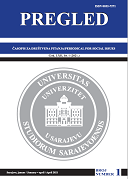KONSOCIJACIJSKA DEMOKRACIJA ARENDA LIJPHARTA VS. LIBERALNA DEMOKRACIJA PRIMJER BOSNE I HERCEGOVINE
CONSOCIATIONAL DEMOCRACY OF AREND LIJPHART VS. LIBEAL DEMOCRACY BOSNIA AND HERZEGOVINA AS CASE STUDY
Author(s): Slaven KovačevićSubject(s): Politics, Government/Political systems, Politics and Identity
Published by: Univerzitet u Sarajevu
Keywords: consociational democracy; liberal democracy; Thymos; Power Sharing; linguistic communities; ethnic communities; Bosnia and Herzegovina;
Summary/Abstract: Consociational democracy, as the subject of various researches, political science, sociological or any other, very often initiates different interpretations or contains elements of a certain ambiguity, which range from incorrect understanding of the term to its use for scientific or political purposes. In this paper, the theoretical views of Arend Lijphart, the author who left the biggest mark in the consideration of consociational democracy, will be analyzed, and considered from the point of view of liberal democracy, by pointing out certain differences and their significance within the practical implementation of both political forms. At the same time, an effort will be made to make a comparative analysis of consociational democracy with the historical and political heritage of Bosnia and Herzegovina. The aim of this paper is to point out various irregularities and ambiguities that appear in public discourse, in such a way that the details of Lijphart's works are used to justify current political views or intentions for a new political order in Bosnia and Herzegovina. As input, experiences from the political systems of Belgium and Switzerland will be used, and put in relation to the political system in Bosnia and Herzegovina.
Journal: PREGLED - časopis za društvena pitanja
- Issue Year: LXII/2021
- Issue No: 1
- Page Range: 113-136
- Page Count: 24
- Language: Bosnian

